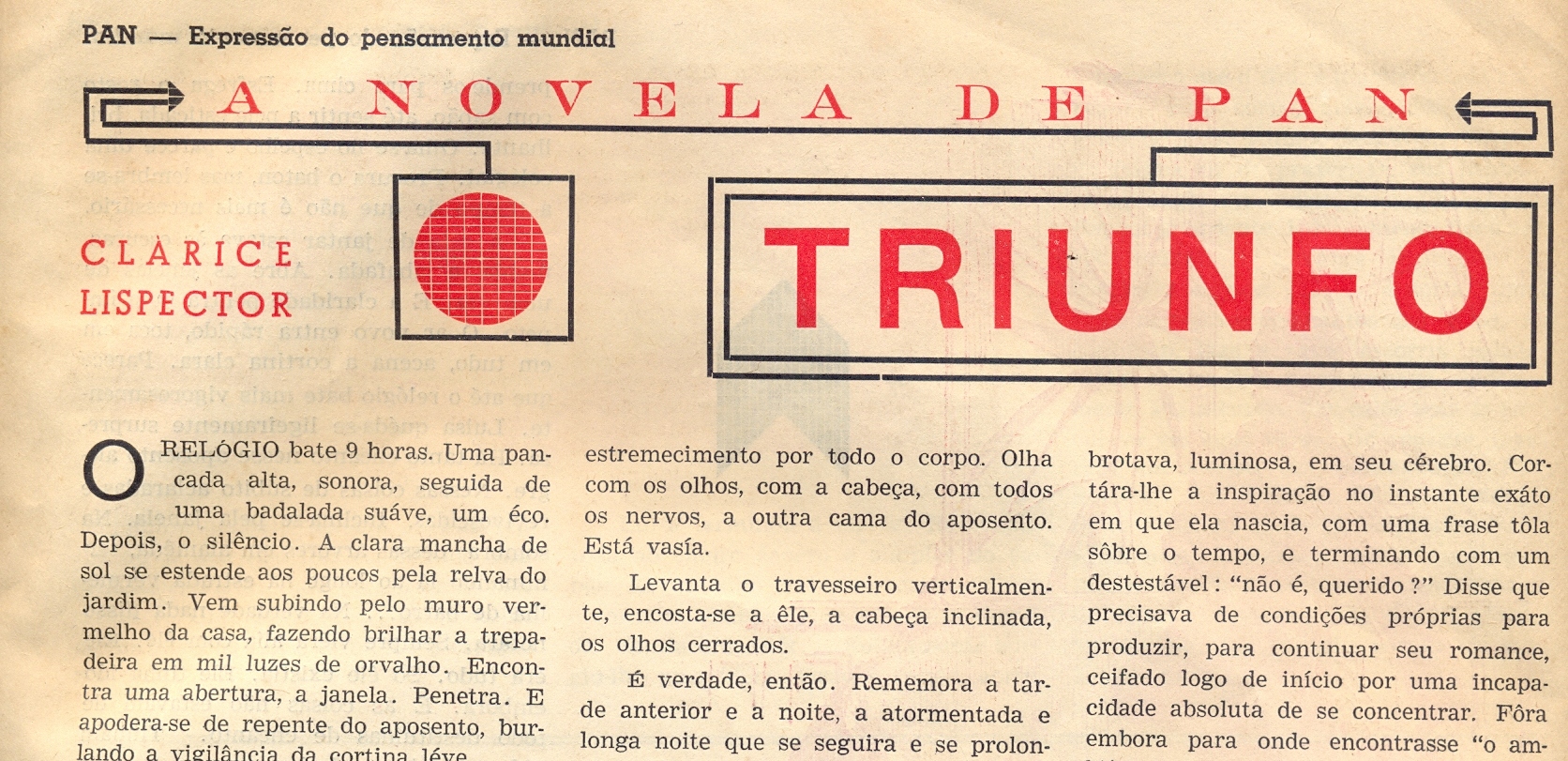, "Triumph," Clarice's Press Debut. IMS Clarice Lispector, 2015. Disponível em: https://site.claricelispector.ims.com.br/en/2015/06/25/triunfo-a-estreia-de-clarice-na-imprensa/. Acesso em: 26 July 2024.
Among the set of documents Paulo Gurgel Valente recently donated to the Moreira Salles Institute are some photographs, 120 letters from Clarice Lispector to her sisters Tania Kaufmann and Elisa Lispector and, in particular, a copy of the magazine Pan, Issue 227, from May 25, 1940. This issue contains the three-page story “The Triumph” – Clarice Lispector’s first registered collaboration with the press. The debut novel, Near to the Wild Heart, would be released only in 1943.
“The Triumph,” which was not part of any later story collections, anticipates a theme that will run through the entirety of Lispector’s works. The story is set in the domestic sphere and relates the experience of a separation from the point of view of the character Luísa, whose tormented argument with her husband the night before leads to his departure. Absence, the extreme emptiness, and the uncertainty of his return underscore the items that did not seem to exist for her previously – she had learned only to perceive her husband (and her circumscribed daily life), her object and main objective.
It strikes eleven, long and leisurely. A bird lets out a piercing cry. Everything has stood still since yesterday, thinks Luísa. She’s still sitting up in bed, stupidly, not knowing what to do. Her eyes fix on a marina, in cool colors. Never had she seen water give quite that impression of liquidness and movement. She’d never even noticed the painting. Suddenly, like a dart, wounding sharp and deep: “He’s gone.”
The narrative explores the entire semantic vocabulary of the gaze, thus accentuating the sense of deficiency and dependency on this male figure. From the moment of abandonment, the character sees herself as alone, everything around her is noisy, mediocre, and rueful. Luísa is estranged from the place that should supposedly be familiar.
The beginning of the reversal comes when, after crying until she feels weak, she “goes to the sink and splashes her face.” (Water.) Through this act, “the dining room [that] lay in darkness, humid and stuffy” is suddenly and all at once illuminated by the brightness of the open windows. The air is new and touches everything. Luísa realizes that things – always things – “hadn’t entirely lost their charm. They had a life of their own.” Furthermore: if earlier the entire world was the inside (her man, her room – the sheets and pillows –, the ceiling, the moonless night), now, leaning against the window – the outside –, Luísa visualizes the trees, the red clay dirt road. Reoriented in her territory, she takes action: she gathers up some clothes and takes them to the large wash basin at the end of the backyard. (Water.) Luísa leaves home and defies the unexpected.

It would not be an exaggeration to say that the scene of washing clothes has a strong erotic nuance: “Bent over like that, moving her arms vehemently, biting her lower lip from the effort, the blood pulsing strong throughout her body, she surprised herself (…). A sweet breeze made the hairs on the back of her neck rise, dried the suds on her fingers. Luísa finished the chore” and, exhausted, she “felt a wave of heat…” when, suddenly the idea comes to bathe in the “large spigot, gushing clear water.” “She took off her clothes, opened the spigot all the way, and the cold water coursed over her body, making her shriek at the cold.” The spontaneous bath “made her laugh with pleasure (…)” and her bathtub “took in a marvelous view, beneath an already blazing sun.”
There is no way to avoid evoking here the symbolic value of water in the most diverse literary and cultural traditions. From the river of Heraclitus, in which no man, not even the water, is the same after a swim – everything, everything flows –, to Catholic rituals, such as baptism and holy water, and even the worship in Celtic mythology of water that “symbolizes the primal substance from which all forms come and to which they will return either by their own regression or in a cataclysm.”[1], guaranteeing longevity, force of creation, and healing. One must also mention, among the five rivers of Hades, the Lethe, the touching of whose (lethal) waters causes souls to lose their earthly memories and begin the process of return to the world of the living. One of the two main myths of the birth of Aphrodite is closely related to water: the Titan Cronos cuts the genitals of the despot Uranus and throws them into the sea, and from this contact the goddess of beauty, fertility, and sexuality is born.
More than depleted forces, water restores freedom to Luísa, returns stability and the feeling of self-sufficiency: “She looked around at the perfect morning, breathing deeply and feeling, almost with pride, her heart beating steadily and full of life.” After the bath, the triumphant certainty comes to her: her husband would return “because she was the stronger one,” because it is she – the weaker tie? – that he needs and depends on.
[1] ELIADE, Mircea. Patterns in Comparative Religion, New York: Sheed and Ward, 1958. Translated from the French edition, Traite d’histoire des Religions, by Rosemary Sheed. Paris: Editions Payot. (p.188)







